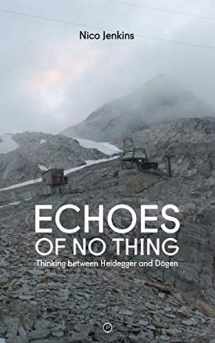
Echoes of No Thing: Thinking between Heidegger and Dōgen
Book details
Summary
Description
Echoes of No Thing seeks to understand the space between thinking which Martin Heidegger and Eihei Dōgen enunciate in their writing and teachings. Heidegger most clearly attempts this in Contributions to Philosophy (of the Event) and Dōgen, the 13th-century Zen patriarch, does this in his Shōbōgenzō, a collection of fascicles which he compiled in his lifetime. Both thinkers draw us towards thinking, instead of merely defining systems. Both Heidegger and Dōgen imagine possibilities not apparent in the world we currently inhabit, but notably, find possible, through a reorientation of thinking—a soteriological reimagining of that very world—clearings for the presencing of an authentic experience in the space which emerges between certainties. This is explored through a close reading of their conceptions of time and space, and as a listening to the echoes that resonate between the two thinkers.
While Heidegger often wrote about new beginnings (as well as about gathering oneself, preparing the site, clearings, and practicing) in preparation for the evental un-concealing of truth, nowhere is this as present in a text as the enigmatic, difficult, and in fact beautiful, Contributions. To call a text beautiful, especially a work of philosophy, risks committing an act of disingenuity, and yet Contributions, like Derrida’s Glas or Benjamin’s unfinished Arcades Project rises to this acclaim through its very resistance to a system, its refusal to be easily digested, or even understood. Contributions, as a text is unfinished, partial, even at times muttered; it is the beginning of a thinking which takes place on a path and as such cannot imagine—or refuses—its final destination. It invites us to take up towards, but not to insist on, its thinking; it is a “turn” away from the reason and logic of a technologized world and returns philosophy—as a thinking—to a place of wonder and awe.
Dōgen’s Shōbogenzō, from another culture and time entirely, is also a beautiful text, for similar reasons. The Shōbogenzō, gathered first as a series of talks given by Eihei Dōgen (and later composed as written texts) details the process of understanding which leads, for Dōgen, to a position of pure seeing, or satori, and yet these talks are not simply rules for monks, and imprecations and demands for a laity; rather they open a being’s thinking to the possibility of something purely other; they work as a transition across worlds, and, when considered, and more than anything practiced, they open us to an other world.
What both thinkers illustrate, as do the other thinkers drawn on in this project—most notably, those philosophers associated with the Kyoto School, who were both intimately aware of Dōgen’s work, and studied, or studied with, Heidegger—and which is detailed in Echoes of No Thing, is that world is not a fixed, stable entity; rather it is a fugal composition of possibility, of as yet untraversed—and at time un-traversable—spaces. Echoes of No Thing seeks to examine, within the lacunal eddies of be-comings arrival, that space between which both thinkers point towards as possible sites of new beginning.


We would LOVE it if you could help us and other readers by reviewing the book
Book review



